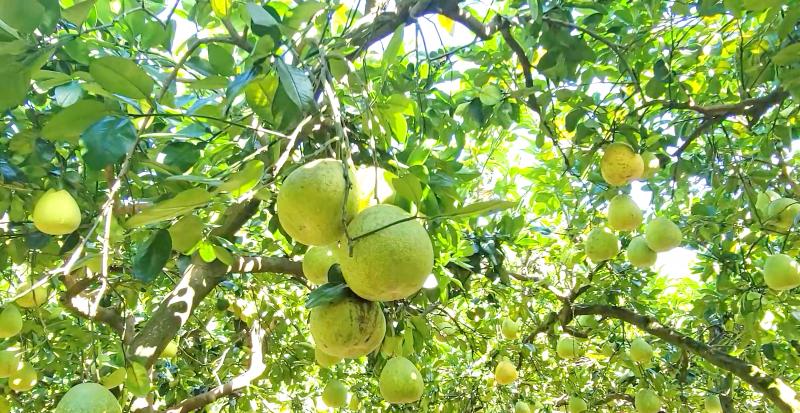Pomelo production is to fluctuate wildly over the next decade, growing steadily until plummeting by 40 percent as climate change affects temperatures and rainfall, Greenpeace Taiwan said on Thursday.
Taiwan produces an average of 74,000 tonnes of pomeloes per year with a steadily rising yield, averaging 13,000kg per hectare over the past five years, the environmental group said.
However, Greenpeace climate change models using data from the Central Weather Bureau and the Ministry of Science and Technology’s Taiwan Climate Change Projection Information and Adaptation Knowledge Platform show dramatic fluctuations in production over the next decade, it said.

Screen grab by Lu Hsien-hsiu, Taipei Times
If carbon emissions continue at their current pace, the two most important pomelo growing regions in the country — Tainan’s Madou District (麻豆) and Rueisui Township (瑞穗) in Hualien County — are to experience the worst production shocks in a century, it said.
Unstable weather could reduce yield from a peak of about 17,900kg per hectare in 2024 to about 12,600kg per hectare by 2029, a decline of 40 percent over a five year period, Greenpeace said.
The primary reason for this dramatic fluctuation is shown to be unstable low temperatures in June, with about 790kg per hectare lost for every 1°C of warming, it said.
June is peak growing season for pomeloes, during which time fluctuations in daily temperatures have a significant effect on fruit development and output, Greenpeace East Asia campaigner Liu Yi-chun (劉羿君) said.
From now until 2024, June temperatures are expected to fall, causing yields to climb, the group said.
However, in the five years that follow, temperatures are expected to rise, resulting in a drop in production from 2024 to 2029, it added.
This variation would directly affect growers’ income, with an oversupply in the next few years potentially tanking prices, followed by a collapse that would pose a challenge to supply and demand, it said.
Aside from rising temperatures, unsteady precipitation would also impact yields, Greenpeace said.
The group said that farmers told them that unstable weather patterns over the past four years have made it difficult to estimate the growing calendar, with typhoons arriving at unusual times and plum rains giving way to drought conditions.
Farmers’ livelihoods depend on the weather, leaving them especially vulnerable to climate change, Liu said.
The Council of Agriculture last month announced a NT$10 billion (US$360.54 million) annual fund to help farmers adapt to climate shocks, but some might never see the money without a plan for how local governments should distribute it, Liu added.
Greenpeace called on local governments to pass ordinances governing the distribution of federal assistance, as well as develop strategies to help farmers deal with climate change through assessing risk and ensuring access to water.

The Grand Hotel Taipei on Saturday confirmed that its information system had been illegally accessed and expressed its deepest apologies for the concern it has caused its customers, adding that the issue is being investigated by the Ministry of Justice Investigation Bureau. The hotel said that on Tuesday last week, it had discovered an external illegal intrusion into its information system. An initial digital forensic investigation confirmed that parts of the system had been accessed, it said, adding that the possibility that some customer data were stolen and leaked could not be ruled out. The actual scope and content of the affected data

‘LIKE-MINDED PARTNER’: Tako van Popta said it would be inappropriate to delay signing the deal with Taiwan because of China, adding he would promote the issue Canadian senators have stressed Taiwan’s importance for international trade and expressed enthusiasm for ensuring the Taiwan-Canada trade cooperation framework agreement is implemented this year. Representative to Canada Harry Tseng (曾厚仁) in an interview with the Central News Agency (CNA) said he was increasingly uneasy about Ottawa’s delays in signing the agreement, especially as Ottawa has warmed toward Beijing. There are “no negotiations left. Not only [is it] initialed, we have three versions of the text ready: English, French and Mandarin,” Tseng said. “That tells you how close we are to the final signature.” Tseng said that he hoped Canadian Prime Minister Mark Carney

President William Lai (賴清德) yesterday bestowed one of Taiwan’s highest honors on Saint Vincent and the Grenadines (SVG) Ambassador Andrea Clare Bowman in recognition of her contributions to bilateral ties. “By conferring the Order of Brilliant Star with Grand Cordon on Ambassador Bowman today, I want to sincerely thank her, on behalf of the Taiwanese people, for her outstanding contribution to deepening diplomatic ties between Taiwan and SVG,” Lai said at a ceremony held at the Presidential Office in Taipei. He noted that Bowman became SVG’s first ambassador to Taiwan in 2019 and

A man walks past elementary school artworks at the Taipei Lantern Festival in Ximen District yesterday, the first day of the event. The festival is to run from 5pm to 10pm through March 15.